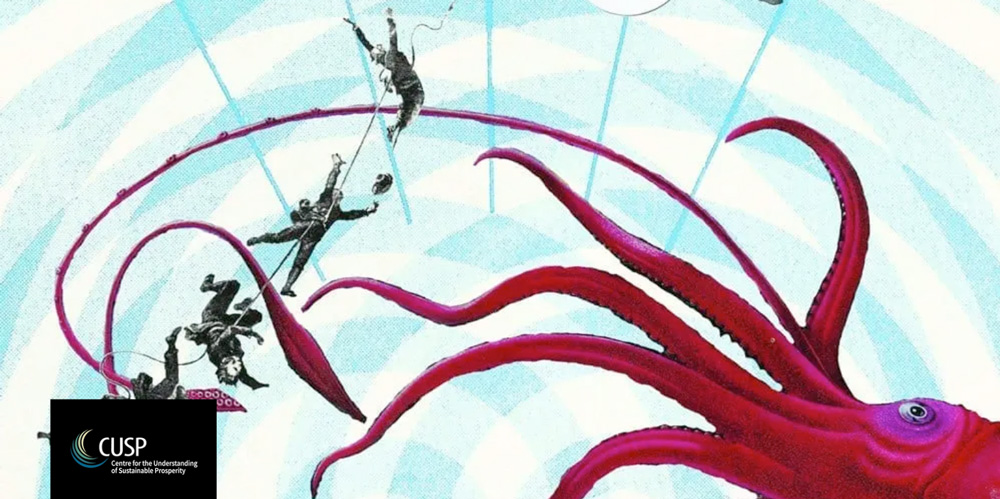A new moral foundation for effective politics?—Populism, loyalty and the relevance of Ruskin | Blog by Charles Seaford
We are currently trapped between dysfunctional forms of populism and an increasingly defunct policy orthodoxy of market liberalism, Charles Seaford argues. But this is not inevitable. We need to reconstruct the moral foundation for politics, and build the alliances needed to give it political and practical expression. (This blog is an edited version of a presentation given at the A Future Fantastic festival, 18 July 2019).

Recently there was an article in the FT headlined ‘Left-behind voters outline vision for life after Brexit’. It reported a study on what ‘Leave’ voters in deprived areas wanted politicians to do once Brexit was done. The message was very clear: decent jobs and training for young people and low paid adults; and support for local businesses and for revived local high streets.
I argued in my recent book Why Capitalists need Communists: The Politics of Flourishing that if we want to deliver these kinds of thing—as well as deal with other big problems such as climate change—then we need to reconstruct the moral foundation of our politics. If we don’t, we will let the debate remain one between dysfunctional forms of populism and an increasingly defunct policy orthodoxy, what I call market liberalism: the view that economies should always be managed using markets, provided their recognised failures and unjust consequences are dealt with. But, I also argued, this is not inevitable. It is perfectly possible to reconstruct this moral foundation, and to build the alliances needed to give it political and practical expression.
Before I turn to Ruskin and why he is relevant to this, let me explain what I mean by moral foundation by giving a few examples from recent political history.
Moral foundations
So first of all, take the Labour Party in the 1930s and 40s. It had a very clear mission—to improve the material conditions of the working class. But this was connected to a strong morality of correcting the vivid injustices that existed at that time, and this formed the moral foundation for Attlee and his government.
In the 1980s, Margaret Thatcher’s programme was designed to advance independent, resourceful individuals and their families—but this too had a moral foundation because she attributed moral value to independence, resourcefulness and the family.
By the time Tony Blair took over the Labour Party, advancing the interests of the working class was no longer its mission—it needed a broader appeal—and correcting social injustice was an inadequate moral foundation for this. Blair was successful because he changed the foundation—like other market liberals he drew on the utilitarian morality of Jeremy Bentham that equates good with maximising pleasure and minimising pain. This morality also underpins neoclassical economic theory, and Blairite market liberalism can be seen as the political expression of that theory.
And now the populists, who have exploited the vacuum caused by market liberalism’s policy failures—its failure to provide good jobs and prosperous high streets—they too have a moral foundation. They have rejected Benthamism and the neoclassical economic theory associated with it, but they are not amoral; they have replaced it with the morality of the clan, of the community, and indeed the imagined community, the nation. These have become the primary source of value, of meaning, of pride—of feeling that you matter.
In other words, effective politics are built on strong moral foundations. Readers can no doubt identify ineffective politicians trapped by a disconnect between their moral convictions and their political programmes.
Why is a moral foundation so important? I think there are two reasons. First, moral foundations create the conviction and determination needed for effective action. And second, they make possible alliances that extend beyond sectional interest—the alliances also needed for effective action. They bind different people together.
So if there is to be a progressive alternative to market liberalism and populism then it too will need a moral foundation—and one that can have wide appeal, can form the basis for an alliance, and not simply a nostalgic reversion to class loyalty.
Ruskin, Marx and the Pope
So how is Ruskin relevant to this? He is explicit that wealth has a moral component.
In the final paper in Unto this Last he argues “that man is richest who, having perfected the functions of his own life to the utmost, has also the widest helpful influence, both personal, and by means of his possessions, over the lives of others”. For wealth is not just a matter of possession, but also of ‘capacity’—and not just capacity but capacity to have a helpful influence.
The artist, or craftsman is Ruskin’s preferred example of the person with this capacity. In The Nature of Gothic Ruskin describes the happiness and nobility associated with this in the Gothic era:
“A magnificent enthusiasm, which feels as if it never could do enough to reach the fulness of its ideal; an unselfishness of sacrifice, which would rather cast fruitless labour before the altar than stand idle in the market; and, finally, a profound sympathy with the fulness and wealth of the material universe.”
He goes on:
“Nor is it to be wondered at, that, seeing her [nature’s] perfect and exquisite creations poured forth in a profusion which conception could not grasp nor calculation sum; he [the Gothic craftsman] should think that it ill became him to be niggardly of his own rude craftsmanship; and where he saw throughout the universe a faultless beauty lavished on measureless spaces of broidered field and blooming mountain, to grudge his poor and imperfect labour to the few stones that he had raised one upon another, for habitation or memorial.”
William Morris, the artist, craftsman, publisher and—unlike Ruskin, socialist—tried to sum up the message in a preface to the Nature of the Gothic.
“For the lesson which Ruskin here teaches us is that art is the expression of man’s pleasure in labour; that it is possible for man to rejoice in his work.”
Ruskin and Morris were distinctive in the central role they gave to art, but the value of work—work as central to what makes life worthwhile—has been described by many others.
André Gorz, writing in the Marxist tradition, put it thus:
“Working is not just the creation of economic wealth; it is also always a means of self-creation. Therefore we must also ask…whether the work produces the kind of men and women we wish humanity to be made of.”
Pope John Paul II said something broadly similar in his encyclical Laborem Exercens:
“[Work] actions must all serve to realize his humanity, to fulfil the calling to be a person that is his by reason of his very humanity….[Thus] in the final analysis it is always man who is the purpose of the work.”
The alternative to utilitarianism
Ruskin, Morris, Gorz and the Pope are all part of a long standing tradition at odds with the Benthamite morality that underpins neo-classical economics, and the market liberalism that remains, for all its failures the policy orthodoxy to this day. For in this alternative tradition, pleasure and pain—varieties of experience—are not the measures of a good life. What matters is what we do and how we relate to the world. For Ruskin this was a matter of the ‘helpful influence’ of the truly rich man. For Morris, it was a matter of the joy of creative work. For the Pope, it was the opportunity work provides for fulfilment. Philosopher Alasdair Macintyre, in the Aristotelian tradition, has argued that a life well lived involves participation in ‘practices’—dancing, philosophy, different kinds of work—each of which has socially defined standards of excellence, making the good life intrinsically social. Others—and this perhaps is the common view—have said that what matters are personal relationships of love and friendship. The religious believe that what matters is the relationship with God.
One can sum up the difference with Benthamism by saying that in all these accounts, what matters is the person’s relationship with the world around him or her rather than the quality of the person’s experiences. Life is conceived of as a matter of relationships—with people, with things, with nature, with God—and a good life is one with good relationships. This is quite different from utilitarianism in which life is a matter of experiences and a good life is one with good experiences.
Psychologist Corey Keyes uses the concept flourishing to describe something like this. As he puts it, those who flourish—and as a result are happy:
“have warm and trusting relationships, see themselves developing into better people, have a direction in life, are able to shape their environments to satisfy their needs, and have a degree of self-determination”.
They also have a positive relationship with society. They:
“see society as meaningful and understandable… as possessing potential for growth… they feel they belong to and are accepted by their communities… they see themselves as contributing to society”.
In this account of flourishing—and indeed in the tradition as a whole we can distinguish two strands: relationships with people and community, and relationships with the world expressed through work—Ruskin’s craftsman’s “profound sympathy with the fulness and wealth of the material universe.”
The alternative to populism
Can these strands help us provide an alternative to populism? I think they may be beginning to do so.
When Erdogan was defeated in the Istanbul city elections recently—a big blow for an authoritarian populist—a representative of the opposition party was interviewed on the Today programme. She said that the basis for their successful anti-populist campaign was the idea of caring for each other.
What a simple and what an old idea! Could it be part of an effective counter to the clannish morality of the populists in this country as well as in Turkey? Could it be a way of turning the morality of community from something toxic to something confident and outward looking? Could it even support the idea of revived high streets, benign symbols of community? I am not sure, but it is certainly worth thinking about.
In the United States, Elizabeth Warren, one of the Democratic Party front runners, has made explicit that her economic policy will be worker centered: workers’ interests will count for more than consumers’ interests. This is to reject the Benthamite, neoclassical, market liberal view, in which consumption and therefore consumers’ interests come first. It is not itself an ethical statement—but it would fit an ethic in which work played a central role, the kind of ethic that Ruskin, Gorz, the Pope and Macintyre in their different ways described. Will she draw on this ethic? I don’t know, but again it is worth thinking about.
In both cases, a moral foundation to the political programme could help create the alliances across society essential to drive significant change—and perhaps even counter populism. It will not succeed by attacking populism, but by drawing on an understanding of its appeal, and shifting its moral foundation.
In organisation theory, a distinction sometimes made between two kinds of organisational loyalty. Both are manifest in comradely behaviour, a sense of belonging, a willingness to take orders, and sacrifice personal interest. However one form of loyalty is to the organisation as such, to its history, its past. The other is to the purpose of the organisation, to its plans, its future. The latter, not surprisingly, tends to be associated with more diversity, innovation and tolerance. It is more confident and outward facing. And sometimes businesses make the shift from the former to the latter type of loyalty.
If we are to counter populism, we should not be trying to attack loyalty to the community—and local high streets—but to help it make a similar shift. This, as in firms, is a matter of confidence. And we know this is possible, because this above all was what characterised Britain in 1945, when Labour’s slogan was “And now—win the peace”. As one young man writing to a friend at the time:
“We’ve shown in this war that we British don’t always muddle through, we’ve shown we can organise superbly. No excuse any more for unemployment, and slums, and underfeeding. Using even half the vision and energy and invention and pulling together we’ve done in this war, and what is there we cannot do?”
In my book I go into more detail about what we can do, and how the alliances needed to do these things can be formed, just as they have been during periods of radical change in the past.
Link
- Why Capitalists Need Communists: The Politics of Flourishing is available on the Palgrave website (30% discount code: Seaford2019).




